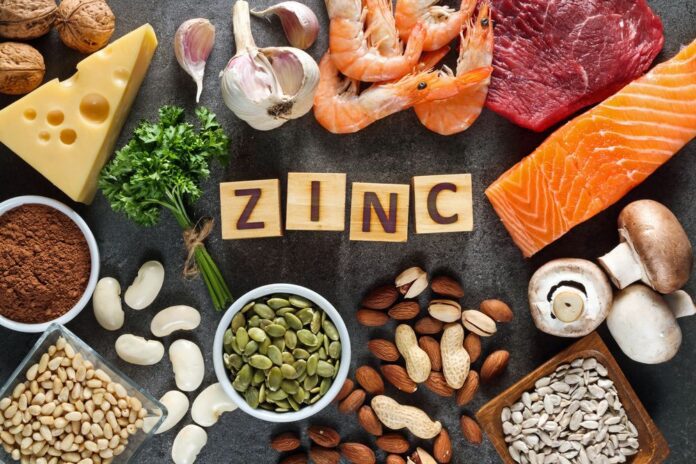What is Zinc?
The body needs zinc, a crucial nutrient, for healthy health. This mineral boosts immunity and lowers illness by inhibiting harmful cells and bacteria. Zinc is necessary for system homeostasis and balance as well as the catalysis of more than 100 metabolic and enzymatic processes in the body.
More than 300 enzymes in the body depend on the mineral zinc to function properly. It aids in the creation of DNA, the production of proteins, immune system bolstering, maintenance of our sense of smell, and enzyme activation. Additionally, zinc functions as a neurotransmitter, enabling efficient cell communication within the body. Although it is present in many meals, zinc insufficiency is more frequent than you may think.
Health advantages of zinc
We are all aware that zinc has a crucial role in our bodies. It is important to comprehend the many health benefits of zinc before reviewing the sources of foods high in zinc.
- Immune system stimulant
- It Aids in the Treatment of Cancer
- Keep Your Cardiac Fitness Up
- Foods high in zinc help twisted healing
- Optical wellness
- Disease of the Mind
- Diarrhea
- Acne
What is the significance of zinc?
In order for the body to produce new cells and enzymes, zinc is required. It’s essential for a strong immune system, proper food digestion, and recovery from injuries.
Here is the Top Foods Rich in Zinc.
Different Vegetables
Although they are not particularly good sources, some remarkable fruits and vegetables do contain a respectable quantity of zinc. Green beans, kale, and potatoes are a few examples. Consuming these vegetables has been associated with a lower risk of chronic diseases including heart disease and cancer, even if they might not give the body the appropriate quantity of zinc. The senses benefit from potatoes as well. The best remedy for men’s health issues is Fildena 100 or Cenforce.
Cashews
Cashews have a high zinc content as well as nutrients including magnesium, iron, selenium, and phosphorus. 18 cashews, or one ounce, contain 1.6 mg of zinc, which is 15% of your daily requirement. It is rich in phytochemicals, plant-based proteins, good fats, and antioxidants.
Cereal grains include wheat germ.
A 100-gram serving of wheat germ contains 17 mg of zinc, or almost of the daily recommended intake for this mineral. By adding toasted wheat germ to your salad, you can include it in your diet.
Fruits
Zinc is a mineral that is rarely found in substantial quantities in fruits, but some varieties are exceptionally rich in it. One fresh pomegranate provides 1 mg of zinc, placing the pomegranate fruit at the top of the list. A medium avocado contains 1.3mg of zinc, making them another food that is strong in the mineral. Additionally, a rich source of zinc is berries. While raspberries and loganberries each have 0.5mg of zinc in a cup, blackberries have 0.8mg. The amount of zinc in a cup of dates is 0.4 mg.
Shellfish
Some of the best natural sources of zinc include oysters, lobster, clams, clam juice, crab, mussels, shrimp, scallops, and other shellfish. Eating seafood once or twice a week is advantageous because, even if we unintentionally consume contaminated seafood, our healthy bodies can flush it out.
Legumes
Beans, lentils, and chickpeas are just a few examples of legumes that are rich in zinc. Even 100g of cooked lentils has roughly 12% of the recommended daily intake for this critical mineral.
Legumes are a high-protein, low-fat food that is also rich in minerals, vitamins, and dietary fiber, according to studies published in Clinical Diabetes. It’s time to incorporate these plant sources of zinc into stews, savory soups, and salads because sprouting, heating, fermenting, or soaking them can increase their effectiveness.
Nuts
One of Mother Nature’s most potent all-around foods, nuts are full of beneficial vitamins, fats, and minerals (including zinc).
Listed below are a few nuts high in zinc:
- Pine nuts 12%,
- Pecans 9%,
- Almonds 6%,
- Walnuts 6%,
- Peanuts 6%,
- And hazelnuts 5%.
Meat
Zinc can be found in high concentrations in a wide range of meats, including beef and lamb, and is particularly abundant in red meat as a food source:
In fact, 4.8 mg of zinc, or 44% of the daily required dose, may be found in 100 gram of uncooked minced meat.
- This beef has 176 calories, 20 gram of protein, and 10 gram of fat.
- Among other essential components, it also includes a sizeable amount of iron, B vitamins, and creatine.
It’s important to remember that eating a lot of red meat, particularly processed meats, has been associated with an increased risk of heart disease and cancer. If you consume less processed meat and more unprocessed red meat as part of a diet high in fruits, vegetables, and fiber, you might not need to worry about it.
Eggs
Zinc levels in eggs are typical. Since one egg only contains 5% zinc, two eggs per day will be enough to satisfy your needs. 6 gram of protein, 5 gram of healthy fats, and 77 calories make up one egg. Selenium and B vitamins, among other minerals and vitamins, are added to it. It helps to control hormone levels and lowers stress and anxiety, both of which are necessary for a strong libido. Men’s diminished libido can be effectively treated with Fildena.
Seeds
High quantities of zinc can be found in flax, pumpkin, and sesame seeds, which can provide up to 33% of the daily zinc needed. Because these seeds are so rich in vitamins, nutrients, and fiber, your diet will be well-balanced.

